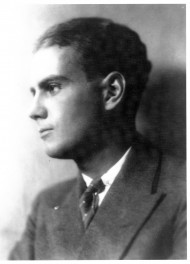 | George Hill Dillon (November 12, 1906 – May 9, 1968) was an American editor and poet. He was born in Jacksonville, Florida but he spent his childhood in Kentucky and the Mid-West. He graduated from The University of Chicago in 1927 with a degree in English. He was the editor for Poetry magazine from 1937 to 1949, during which time he also served in WWII as a member of the Signal Corps. Viewing, from the top of the Eiffel Tower, the German Army being driven from Paris, he signaled, in Morse, "Paris is Free".
Though included in several contemporary anthologies, Dillon's works are largely out of print. Today he is perhaps best known as one of the many lovers of Edna St. Vincent Millay, whom he met in 1928 at The University of Chicago, where she was giving a reading. Dillon was the inspiration for Millay's epic 52-sonnet sequence Fatal Interview and they later collaborated on translations from Charles Baudelaire's Les Fleurs du Mal in 1936.
|
To Losers
George Dillon
Let loneliness be mute. Accuse
Only the wind for what you lose,
Only the wind has ever known
Where anything you lost has gone.
It is the wind whose breath shall come
To quench tall-flaming trees and numb
The narrow bones of birds. It is
The wind whose dissipating kiss
Disbands the soft-assembled rose.
It is the wordless wind that knows
Where every kind of beauty goes.
And if you lose love in the end
Say it was taken by the wind.
| Στους χαμένους
Τζορτζ Ντίλον
Την μοναξιά να ’ναι βουβή, αφήστε.
Μόνο τ’ αγέρι για ό,τι χάνετε, κατηγορήστε,
πού πήγαν πια, μόνο τ’ αγέρι,
τα όσα χάσατε, το ξέρει.
Τ’ ανέμου η ανάσα είναι που θα ’ρθει να σωριάσει
δέντρα φλεγόμενα, ψηλά και να μουδιάσει
τα κοκκαλάκια απ’ τα πουλιά.
Που το εξουθενωτικό φιλί του διαλύει τη μαλακιά
δέση του ρόδου στη βραγιά.
Ξέρει πού πάει κάθε χαμένη ομορφιά
τ’ αγέρι, το χωρίς μιλιά.
Κι αν χάσεις την αγάπη που ’χες ταίρι,
πες πως, στο τέλος, την άρπαξε τ’ αγέρι.
|
μετάφραση: Κώστας Μαντζάκος